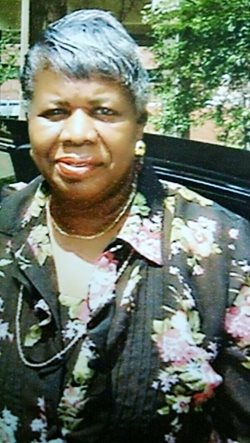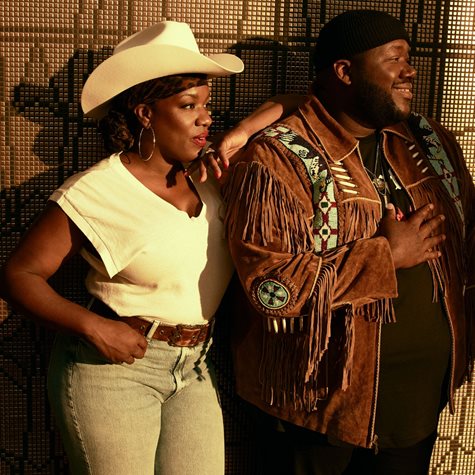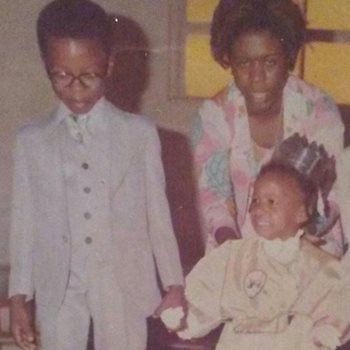
Triple Your Impact This Holiday Season
Triple Your Impact This Holiday Season
Celebrate the holidays with a year-end gift that can go 3x as far to help provide care and support to the millions affected by Alzheimer's disease, and to advance critical research. But please hurry — this 3x Match Challenge ends soon.
Donate Now“Mom Lived for Music”: Musician Tanya Trotter of “The War and Treaty” Shares Her Dementia Story
dementia in 2015, and talks about the power of music on their journey together.
When I was growing up, music was always playing or being performed in our house.
My mom was Panamanian and we listened to a lot of Calypso music. She was also a classical singer so classical was always a must. We attended a Baptist church and that is where my love for and the influence from gospel music began.
My Dad is originally from North Carolina and he always had his Western movies on the TV, so I got into country music, too. Later, when I joined the music department at my high school I started studying folk music and I fell in love with it. And, of course, rock and roll!
Whether I’m making music or listening to music with my friends, it has always been a part of who I am as an artist and a person. R&B, country, pop — any music or lyrics that shake me are close to my heart, as they were to my mom.
Facing the realities of dementia
I was familiar with dementia because both my paternal and maternal grandmothers battled some form of the disease. When I was 12 years old, my maternal grandmother got lost in Panama, where she had lived her entire life, due to dementia. My aunt, a nurse, spent three days looking for her. When she found her, she brought her back to Chicago to live with her. Soon after, my grandmother began to forget our names, and then forgot how to take care of her personal needs.Mom’s experience with dementia was very different from those of my two grandmothers. She was about five months into her retirement when she called me saying that she needed help with her paperwork. She was forgetting things. “I don't feel like myself,” she said. When I asked what she felt like, she said that it was as if someone was ‘pulling’ on her brain. That was the only way she could describe it.
 One day, when she left the stovetop burner on, a kitchen towel caught fire. Thankfully, she was able to put it out. But that tiny fire sparked her stress levels, and her already high blood pressure went through the roof. She couldn't do anything to bring it down and my brother took her to the hospital.
One day, when she left the stovetop burner on, a kitchen towel caught fire. Thankfully, she was able to put it out. But that tiny fire sparked her stress levels, and her already high blood pressure went through the roof. She couldn't do anything to bring it down and my brother took her to the hospital. She called my sister and was speaking in Spanish, her first language; she had already forgotten that the family — my brother, sister and I — only spoke English. After a visit to the hospital, we found out she had a mini-stroke, and probably had many other mild, rapid strokes. When her diagnosis of vascular dementia was confirmed, she was 70 years old.
What I have learned
As a family member, a loved one, a neighbor — speak up when you see the early signs and symptoms of Alzheimer’s. My mom had high blood pressure, and the heart works in conjunction with the brain. So many things can trigger or lead to dementia, and I now know how important cardiovascular health is.My mom was so social and she traveled with me around the world. She was a hotel manager for 25 years. Most of her life was spent working around other people in a very social atmosphere, which she enjoyed. Once dementia developed, she pulled back from social activities. When she could no longer remember people’s names, she stopped going to church every Sunday. When she forgot that she could speak English, my family got her a Spanish-speaking care staff during the day.
Have compassion for the person living with the disease, and make them as comfortable as possible. It's so important to be as engaged and active as you can be. People like my mom thrive on work and social engagement, and I know that if she had lived with the disease longer than she had, I would have made sure she was still doing those things that she loved.
And never neglect focusing on your own emotional journey as a child, caregiver, friend or other family member. Having someone you love forget who you are is difficult. While they are still here, enter their world, and be there for them as they were for you.
Music for Mom
My husband Michael wrote a song during the height of the pandemic called “The Panamania Queen.” When he asked Mom why she always walked everywhere (and took the long way home), she told him that she liked looking up and seeing all of the green trees. She loved nature! The song shares my mom’s journey to America, her work ethic, her love of life.Music played a big part of my mom’s short journey with dementia. She wanted to hear music playing all the time. It was soothing for her.
 Many people with dementia will forget your name, forget their language, forget their loved ones, and yet, so many people living with dementia still remember the music they have always loved.
Many people with dementia will forget your name, forget their language, forget their loved ones, and yet, so many people living with dementia still remember the music they have always loved.I have seen the power of music with my own eyes. When your loved one living with dementia is next to you, listen to music together. Put on something they love, hold their hand and let your bodies feel it. Being able to be a comfort to the person you love on their journey is a special role. Be vulnerable in that moment and just be.
Even though my mom couldn’t speak with me near the end of her life, holding her hand and feeling her squeeze mine showed such strength. A lot of us are afraid of silence that comes with the end of someone’s life, but there are moments in the quiet that are beautiful. Many people are afraid of death, but there's beauty to be found if we're vulnerable enough to stay in that moment.
Honoring Mom’s legacy
There was no time to wrap our heads around the severity of Mom’s disease because she progressed so quickly. My grandmother lived with dementia for many years and I watched her battle it. My mom developed it and it seems as if she passed away in a flash. Two of my loved ones, two completely different experiences.I think back to the times when Mom spoke about singing in theatrical productions like “West Side Story” back in Panama, and how much she loved those experiences. A singer in church choirs both in Panama and America, she was right beside me and my brother, also a singer, as we both began creating our own music. Always a fashionista, she was my own personal stylist and a vocal coach in one!
 Today, I think of my Mom often. I have a room in my house I call my pink room! It's a manifestation room where I place names and pictures, including ones of my mom, on the walls. I light candles near her photos, and I greet her every time I come into the room, just to let her know that I'm thinking about her. I think that it’s important for me to keep her memory alive and at the forefront of my thoughts. I was blessed to have a mom like her and it’s my way of keeping her memory alive for me and my family.
Today, I think of my Mom often. I have a room in my house I call my pink room! It's a manifestation room where I place names and pictures, including ones of my mom, on the walls. I light candles near her photos, and I greet her every time I come into the room, just to let her know that I'm thinking about her. I think that it’s important for me to keep her memory alive and at the forefront of my thoughts. I was blessed to have a mom like her and it’s my way of keeping her memory alive for me and my family.About: Based in Michigan, “The War and Treaty” have chosen the Alzheimer's Association as the beneficiary of their tour via PLUS1, an organization that helps artists add on $1 to their ticket or merchandise purchases to support their favorite charity.

The first survivor of Alzheimer's is out there, but we won't get there without you.
Donate Now
Learn how Alzheimer’s disease affects the brain.
Take the Brain Tour
